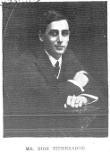The son of eminent Australian actor George S. Titheradge and brother of actresses Madge and Eve Titheradge, Dion Titheradge also established his name as an actor and producer. He was best known, however, as a writer for stage, especially plays, revues, sketches and
film scenarios and songs. One of his most famous songs is 'And Mother Came Too', his most
successful play was The Crooked Billet.
He made his professional stage debut in
Newcastle-on-Tyne in 1908. He contracted malaria while serving as a Royal Fleet Auxiliary officer in World War I, which brought about the end of his involvement in the war and impaired his health in later life.
Titheradge's first screen credits are believed to have been in A Parisian Romance (as Henri de Targy), The Supreme Sacrifice, and Husband and Wife (all 1916). The following year, he appeared in The Whip, The Crimson Dove, and Sunshine Alley. During the late 1910s and early to mid-1920s, he collaborated on a number of songs with fellow Australian Kenneth L. Duffield, amongst others. In 1919, Titheradge and Duffield, then both living in London, wrote the musical comedy Billy's the Boy. Although it has not been established whether a production was ever mounted, a report in the Sydney Morning Herald of 14 February 1920 indicates that it had received a 'trial-hearing (p.8). At least one other theatrical collaboration between the two men is known to have been staged, the musical Healo, which was produced at the Theatre Royal, Adelaide, beginning 24 May 1924. During his time in London during the early 1920s, Titheradge also devoted much of his time to writing picture-scenarios.
Among Titheradge's published works are several collections of sketches and plays, notably From the Prompt Corner (ca. 1925), Out of the Box (ca. 1925), Ups and Downs from Revue (ca. 1926), Behind the Curtain (ca. 1926), From 'Folly to be Wise' (ca. 1931), and Written on Foolscap (ca. 1933). All were published as French editions. He also wrote the three-act play The Crooked Billet (1927). The latter play was turned into a television drama in 1938. Several of his plays were adapted into feature films, including The KC (filmed as His Last Defence, 1919), Toni (1927), and Loose Ends (1930). He adapted one of his novels into the screenplay for the 1932 film Mr Bill the Conqueror, while a sketch, 'Double Damask Napkin,' was later included in the Bing Crosby film Dr Rhythm (1938).
As a screenwriter, Titheradge worked on such British films and television shows as Her Story (1920), The Rising Generation (1928), Loose Ends (1930), The Shadow Between (1931), Her First Affair and The Fortunate Fool (both 1933), and Lillies of the Field and Dangerous Ground (both 1934).
Described as modest and
unassuming with a pleasant personality, Titheradge was twice married. He and his first wife, Margaret Bolton, had two
children, Peter and Meg. His second marriage to Madge Stuart was formalised in 1928. Dion died in London 16th November 1934.
 5084581769310790432.jpg
5084581769310790432.jpg
 5084581769310790432.jpg
5084581769310790432.jpg